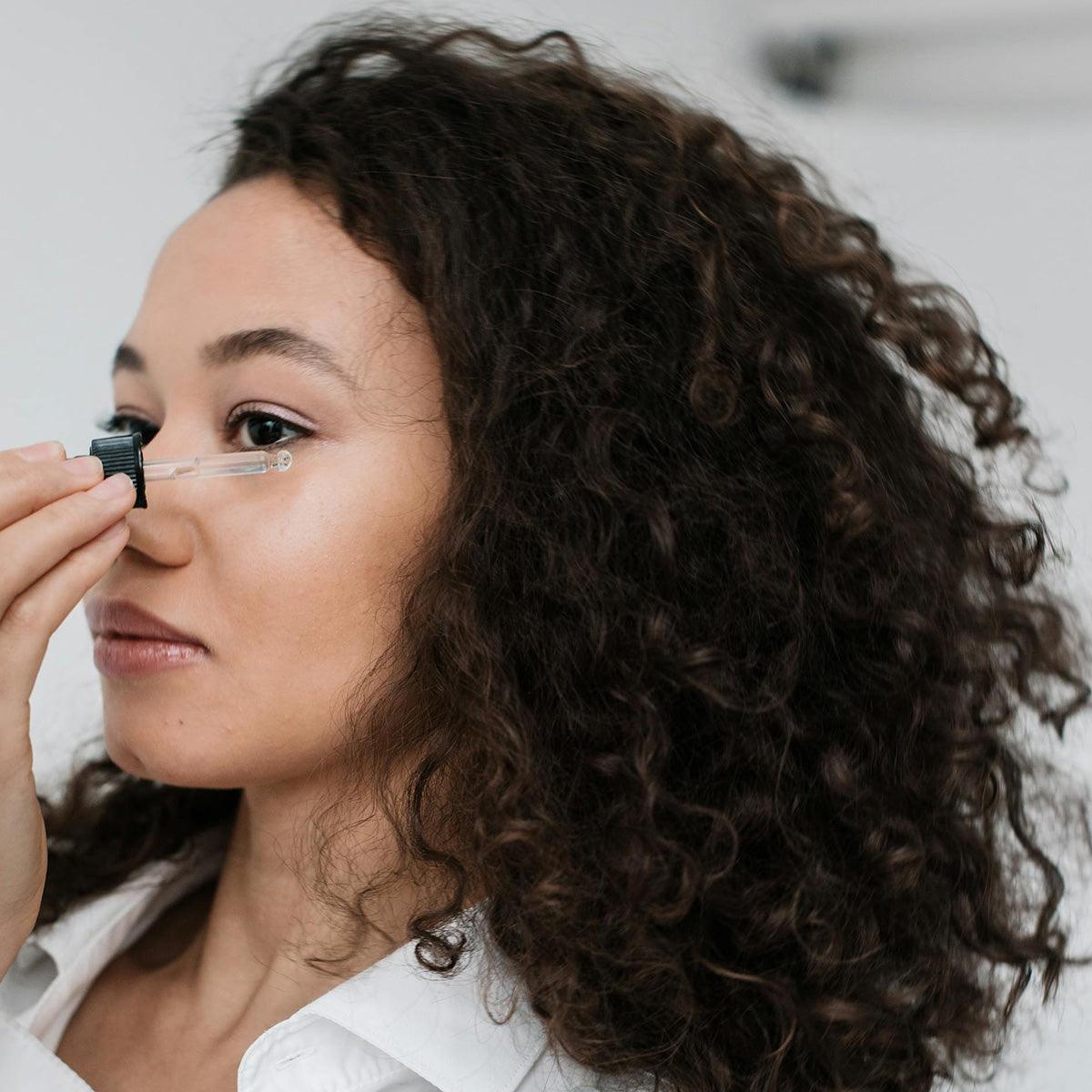Discover why natural vitamin C serums outperform synthetic ones. Learn the science behind acerola cherry, ferulic acid, vitamin E, rutin, and Tremella mushroom for brighter, firmer, youthful skin.
Why Vitamin C Belongs in (Almost) Every Skincare Routine
Vitamin C is a workhorse antioxidant and cofactor for enzymes that stabilize and cross‑link collagen. In skin, that translates to:
-
Brighter tone & fewer dark spots. Vitamin C interferes with melanin formation and can reduce post‑inflammatory hyperpigmentation, sun spots, and uneven tone.
-
Firmer, bouncier skin. By supporting collagen synthesis and defending against free radicals, vitamin C helps soften the look of fine lines and photoaging.
-
Daily environmental defense. Vitamin C helps neutralize oxidative stress from UV exposure, pollution, and blue light—but it’s not a sunscreen. You still need SPF.
-
Support for barrier health. Well‑formulated serums often include humectants and lipids, improving overall texture and glow.
What Vitamin C Can’t Do
-
It won’t erase deep wrinkles overnight.
-
It won’t replace sunscreen.
-
It won’t work if the serum is oxidized, poorly formulated, or used inconsistently.
What is the Best Vitamin C Serum and Why Does It Matter?
Looking for the best vitamin C serum? You’re not alone. This powerhouse ingredient is trending because it can brighten skin, fade dark spots, boost collagen, and protect against environmental damage. But here’s the truth: not all vitamin C serums are equal. The difference between natural and synthetic vitamin C could be the secret to healthy, glowing skin.
Why Natural Vitamin C Outshines Synthetic – Backed by Science
Natural, plant-based sources like acerola cherry, amla, and kakadu plum deliver more than just vitamin C. They come with bioflavonoids, polyphenols, and micronutrients that boost absorption, stability, and antioxidant power. Synthetic ascorbic acid? Effective, but unstable and irritating for many skin types.
What’s the best natural vitamin C source for skin? Acerola cherry tops the list with up to 50 times more vitamin C than oranges, plus powerful phytonutrients for radiant skin.
Natural vs Synthetic Vitamin C: Key Differences
| Feature | Natural Vitamin C (Acerola) | Synthetic Vitamin C (L-Ascorbic Acid) |
|---|---|---|
| Stability | Higher with antioxidants | Low, oxidizes quickly |
| Skin Irritation Risk | Low | High due to acidic pH |
| Extra Nutrients | Yes (bioflavonoids, polyphenols) | None |
| Sustainability | Plant-based | Lab-processed |
| Synergy | Full-spectrum antioxidant network | Single molecule |
Best Ingredients to Pair with Vitamin C for Maximum Results
- Ferulic Acid: Stabilizes vitamin C and enhances UV protection.
- Vitamin E: Fat-soluble antioxidant that works synergistically with vitamin C.
- Rutin: Bioflavonoid that boosts vitamin C efficacy and strengthens skin.
- Tremella Mushroom: Nature’s hyaluronic acid for deep hydration.
Pro Tip: Look for serums combining these for ultimate skin defense.
Best Natural Vitamin C Serum Checklist
- ✔ Derived from acerola cherry, amla, or kakadu plum.
- ✔ Includes ferulic acid, vitamin E, and rutin for antioxidant synergy.
- ✔ Hydration booster like Tremella mushroom.
- ✔ Aloe vera as the first ingredient instead of water for extra soothing hydration.
- ✔ Clean, green formulation with no synthetic stabilizers or harsh chemicals
- ✔ Opaque, air‑tight packaging, minimal exposure to light/air for better stability.
-
✔ Avoid: Fragrance if you’re sensitive, transparent(unstable) dropper bottles
Featured Product: OM Botanical’s Natural Vitamin C Serum
If you want a clean, food-grade, plant-based option, OM Botanical’s acerola cherry-powered vitamin C serum is your answer. It combines:
- Acerola cherry derived potent vitamin C.
- Ferulic acid (from rice) & vitamin E for stability and protection.
- Rutin (from chestnuts) for increased penetration and effectiveness.
- Tremella mushroom for super hydration.
- Aloe vera as the very first ingredient, replacing water for soothing nourishment.
This all-natural vitamin C serum by OM Botanical outperforms all synthetic counterparts in terms of stability, synergistic performance, and skin safety. Perfect for brightening skin, reducing fine lines, and evening tone without irritation.
Comparison: OM Botanical vs. Synthetic Vitamin C Serum (SkinCeuticals)
| Feature | OM Botanical Natural Serum | SkinCeuticals C E Ferulic (Synthetic) |
| Vitamin C Source | Acerola cherry (natural) | Synthetic L-Ascorbic Acid |
| First Ingredient | Aloe vera gel | Water |
| Added Antioxidants | Ferulic acid, Vitamin E, Rutin | Ferulic acid, Vitamin E |
| Hydration Component | Tremella mushroom (plant-based) | None |
| Stability & Synergy | High (natural antioxidants) | Moderate |
| Skin Irritation Risk | Low | Higher (acidic pH) |
| Sustainability | 100% plant-based, eco-friendly | Lab-processed, synthetic |
Winner: OM Botanical delivers a holistic, plant-based formula that not only brightens skin but nourishes and protects without synthetic chemicals.
How to Use Vitamin C Serum for Best Results
- Apply in the morning after deep cleansing and toning.
- Follow with moisturizer and broad-spectrum natural sunscreen.
- Store in a cool, dark place to maintain potency.
Natural vitamin C serums, enriched with ferulic acid, vitamin E, rutin, Tremella mushroom, and aloe vera, provide better stability, synergy, and skin health benefits than synthetic alternatives.
Ready to glow? Discover OM Botanical’s Natural Vitamin C Serum today.























